
U.S. Threatens Starlink Shutdown Amid Ukraine Minerals Dispute
In a high-stakes negotiation, the United States has cautioned Ukraine that access to the Starlink satellite internet service, operated by Elon Musk’s SpaceX, may be terminated if Kyiv does not consent to a critical minerals agreement. This development underscores the intricate link between technological support and geopolitical resource interests.
Starlink’s Role in Ukraine
Since Russia’s full-scale invasion in 2022, Starlink has been indispensable in maintaining Ukraine’s communications infrastructure. The satellite internet service has ensured connectivity for military operations, hospitals, businesses, and humanitarian efforts, with approximately 42,000 terminals reported in use across the country. The potential loss of Starlink would significantly impact Ukraine’s operational capabilities.
The Proposed Minerals Agreement
The U.S. proposal, presented by Treasury Secretary Scott Bessent, seeks a 50% stake in Ukraine’s abundant natural resources, including critical minerals, oil, and gas. This arrangement is intended as compensation for the extensive military and financial aid the U.S. has provided to Ukraine during its conflict with Russia. However, the proposal has been met with resistance from Ukrainian President Volodymyr Zelensky, who has expressed concerns over the lack of concrete security guarantees accompanying the deal.
Escalating Tensions
Following Ukraine’s initial rejection of the proposal on February 12, U.S. officials have intensified pressure, suggesting that failure to reach an agreement could result in the discontinuation of Starlink services. This ultimatum was reiterated during discussions between U.S. Special Envoy Keith Kellogg and President Zelensky in Kyiv on February 20. The prospect of losing Starlink has raised alarms, given its critical role in Ukraine’s defense and civilian communication networks.
Divergent Views Within the U.S. Administration
The situation is further complicated by contrasting perspectives within the U.S. administration. While President Donald Trump has criticized President Zelensky, referring to him as a “dictator” and questioning his importance in peace negotiations, U.S. Special Envoy Keith Kellogg has lauded Zelensky as “the embattled and courageous leader of a nation at war.” This disparity highlights internal divisions regarding U.S. foreign policy toward Ukraine.
International and Domestic Repercussions
The U.S. stance has elicited strong reactions both domestically and internationally. European leaders have expressed support for President Zelensky, emphasizing the importance of democratic values and criticizing the U.S. approach. Within Ukraine, citizens and officials have denounced the U.S. demands as “blackmail,” asserting that such pressure undermines Ukraine’s sovereignty and the sacrifices made during the ongoing conflict.
As negotiations continue, the outcome of this minerals deal remains uncertain. The situation exemplifies the complex interplay between technological dependencies and geopolitical strategies, with significant implications for Ukraine’s future and international alliances.


















